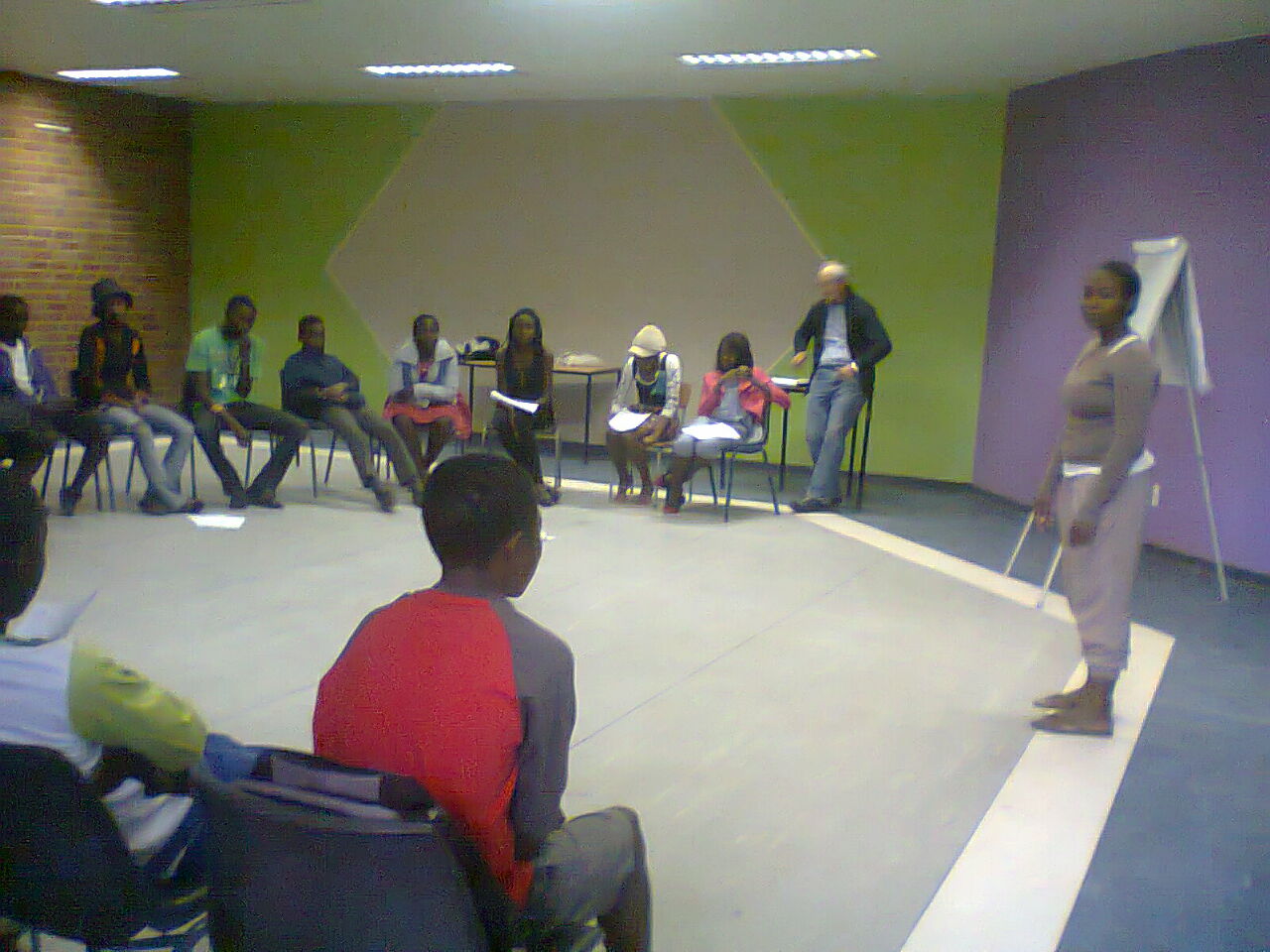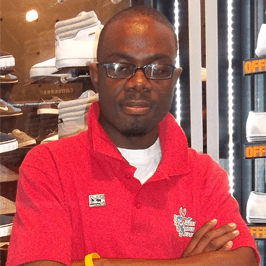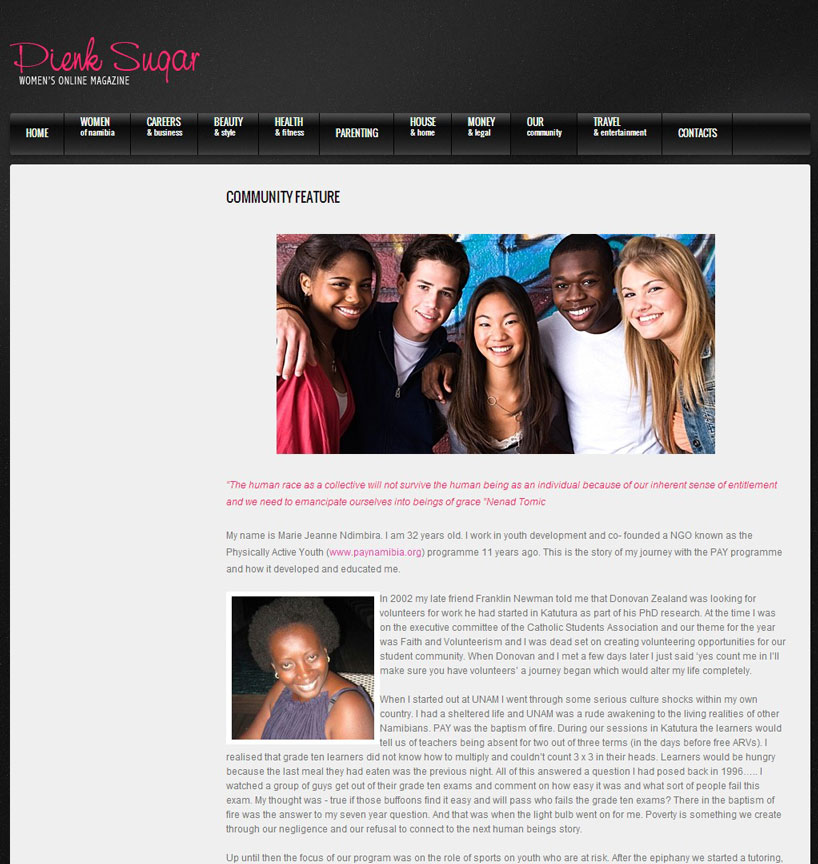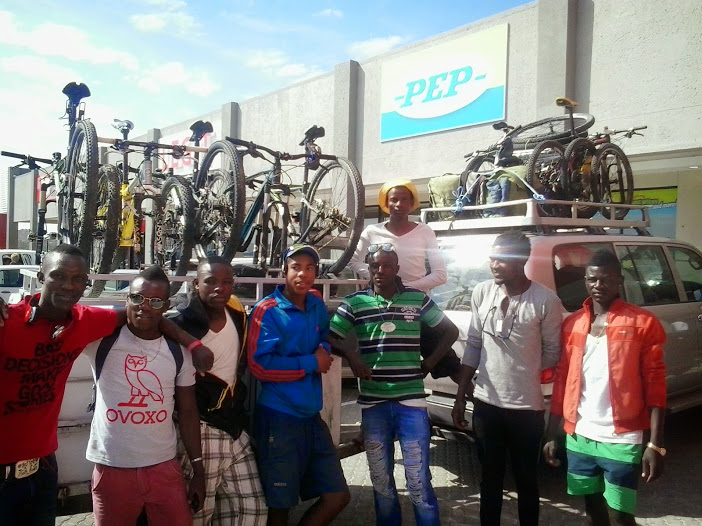Outreach-Community Service
Wednesday, 10 April 2013
P.A.Y. strives to make Namibian communities the key beneficiaries of its programmes. This component is imperative to the success of the programme. Our approach is based on two fundamental convictions:
- Individual development must be carried out simultaneously to community development; and
- Stronger communities heighten the probability of producing successful individuals.
By providing the youth with an opportunity to contribute positively to the development of their community, P.A.Y. empowers youth and fosters a transition in the participants mindset, from being dependent on the programme to being an independent agent of change in the community.
The four pillars of our community outreach are: HIV/AIDS prevention, gender equality, child labour prevention and fighting for a cyclist-friendly infrastructure in Katutura. Here's how we do it.
HIV/AIDS prevention
Simply teaching youth about HIV and AIDS has not been effective in decreasing the incidence of the virus. Instead, P.A.Y. addresses the underlying factors that increase the risk of HIV and AIDS i.e. poverty, poor education, low self-esteem and gender dynamics. In reaction to HIV, P.A.Y. adopts a Pro-Health approach fostering protection and enhancement of the general population’s health. By providing academic support, sports development, a gender programme and life skill opportunities, P.A.Y.s youth attain the skills, information and self-confidence that is necessary to reduce one’s personal risk of contracting HIV and AIDS.
Moreover, participants are provided with all necessary tools, providing an understanding that a person needs and must be valued, making provision for progressive and positive behavior change. The acquisition of such attitudes guarantees a holistically successful life for Namibian youth. 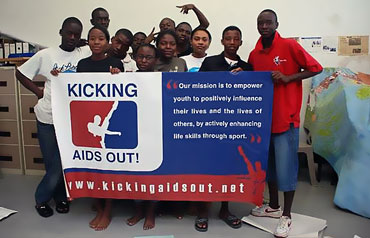 Many HIV messages in P.A.Y. are implemented by using the Kicking AIDS Out Concept as P.A.Y. is a member organisation. Kicking AIDS Out is a concept and an international network that offers an innovative, inclusive, high energy approach that links sports, physical activity and traditional movement games with HIV prevention and education. The most important aspect is that it involves active participation, which is a more effective strategy than just teaching HIV messages in class without involving the learners. The Kicking AIDS Out curriculum builds capacity in youth to help them become stronger leaders and mentors for their peers. It also teaches youth coaches to lead activities that integrate like skills and HIV and AIDS information into sport and physical activity.
Many HIV messages in P.A.Y. are implemented by using the Kicking AIDS Out Concept as P.A.Y. is a member organisation. Kicking AIDS Out is a concept and an international network that offers an innovative, inclusive, high energy approach that links sports, physical activity and traditional movement games with HIV prevention and education. The most important aspect is that it involves active participation, which is a more effective strategy than just teaching HIV messages in class without involving the learners. The Kicking AIDS Out curriculum builds capacity in youth to help them become stronger leaders and mentors for their peers. It also teaches youth coaches to lead activities that integrate like skills and HIV and AIDS information into sport and physical activity.
Youth who qualify can then become leaders and assume greater responsibility for supporting and mentoring other Peer Leaders in their organization. Trained youth leaders who can engage their peers in sports, provide accurate health related information and skilfully create safe spaces for discussion on many sensitive issues that are essential factors in the success of the initiative.
Gender Programming
Both males and females participate in PAY gender programme dedicated to increasing self-confidence, challenging stereotypes, addressing gender dynamics within Namibia and discussing issues that are gender-relevant. The girls programme is called Safe Spaces and its purpose is contained in the following acronym: F.L.A.M.E. Females, Leading, Achieving, Motivating and Empowering. The boys programme is called the P.A.Y. Advocates. The P.A.Y. programme strives to create an environment of gender equality and positive interaction between males and females.
SCREAM: stop child labour
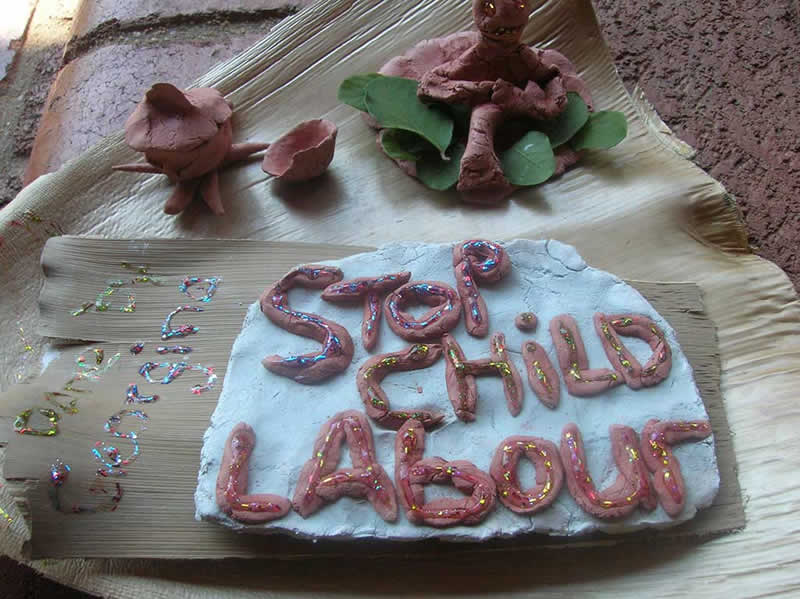 The International Labor Organization (ILO), Programme on Elimination of Child Labour (IPEC) estimates that over 218 million children in the world today are involved in child labour, doing work that is damaging to their mental, physical and emotional development. A number of studies indicate the presence of child labour in Namibia with devastating effects on the learners’ population. Namibia as a country has made the effort to address underlying factors to child labour. These include the National strategy for poverty alleviation and the revision of education policy.
The International Labor Organization (ILO), Programme on Elimination of Child Labour (IPEC) estimates that over 218 million children in the world today are involved in child labour, doing work that is damaging to their mental, physical and emotional development. A number of studies indicate the presence of child labour in Namibia with devastating effects on the learners’ population. Namibia as a country has made the effort to address underlying factors to child labour. These include the National strategy for poverty alleviation and the revision of education policy.
In collaboration with ILO, P.A.Y. has become a key agent working toward raising awareness on child labour. As ILO implementing agency, P.A.Y. Namibia seeks to mobilize the youth, sensitize learners, parents and integrate child labour into the community based life skills initiatives. The mainstay of our approach is SCREAM: Supporting Children’s Rights through Education, the Arts and the Media, education and social mobilization initiative developed by ILO to help educators worldwide in cultivating young people’s understanding of the causes and consequences of child labour. The programme places heavy emphasis on the use of the visual, literary and performing arts. As part of a mini-pilot project in April and May 2012, P.A.Y. conducted a series of life skills days focusing on a core group of grade 7- 12 learners from different schools training them on children’s rights and basic facts on child labour. The learners were then encouraged to spearhead child labour awareness at schools, on radio and television. The campaign culminated in a 5-day camp in Waterberg National Park dedicated to raising awareness on child labour.
Move Windhoek
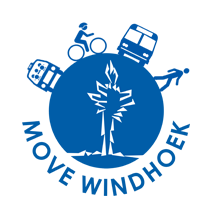 P.A.Y. Namibia is a major shareholder in a "Move Windhoek: Sustainable Urban Transport Master Plan" whose aim is to transform Windhoek's public transport and non-motorised transport to a sustainable, affordable, accessible, attractive and efficient system. The majority of Windhoek residents make use of taxis, namely 35%, followed by 28% who make use of their own car, 26% walk, 7% make use of lifts, 4% make use of the municipal bus service while only 1% make use of bicycling. Accordingly 27% of all trips that are generated can be associated with non-motorised transport. On average 10.3% of the monthly income is spent on transport costs. This increases up to 22.7% in lower income areas such as Katutura. Transport costs remain to be the main motivating factor for developing non-motorised transport.
P.A.Y. Namibia is a major shareholder in a "Move Windhoek: Sustainable Urban Transport Master Plan" whose aim is to transform Windhoek's public transport and non-motorised transport to a sustainable, affordable, accessible, attractive and efficient system. The majority of Windhoek residents make use of taxis, namely 35%, followed by 28% who make use of their own car, 26% walk, 7% make use of lifts, 4% make use of the municipal bus service while only 1% make use of bicycling. Accordingly 27% of all trips that are generated can be associated with non-motorised transport. On average 10.3% of the monthly income is spent on transport costs. This increases up to 22.7% in lower income areas such as Katutura. Transport costs remain to be the main motivating factor for developing non-motorised transport.
Therefore, P.A.Y. undertook to promote the ecological impact cycling as a self-powered, gasoline-free means of transport with massive health benefits. P.A.Y. is the biggest stakeholder in the initiative on the side of Katutura community and its contribution is manifold: 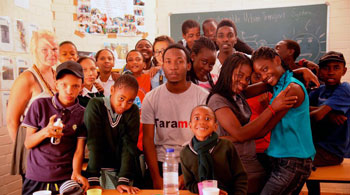 it seeks to sensitise youth on the need to rationalize the existing transport system and draft the youth’s support in promoting the idea in their families, schools and local communities. Pollution reduction and healthy lifestyles encouragement among its members and the wider community are two immediate benefits.
it seeks to sensitise youth on the need to rationalize the existing transport system and draft the youth’s support in promoting the idea in their families, schools and local communities. Pollution reduction and healthy lifestyles encouragement among its members and the wider community are two immediate benefits.
On a more practical level, P.A.Y. has organized workshops in collaboration with Bicycle Empowerment Centre to impart bike-repairing skills on its members (as well as other interested youth), who are a part of an elite cycling team trained by national and international professionals. Creating a positive feedback loop, this enhances the likelihood of a successful implementation of the Transport Master Plan. Moreover, it provides sporting opportunities for young athletes and improves access to income generation possibilities thus contributing to one of P.A.Y.’s perennial aims: poverty reduction.
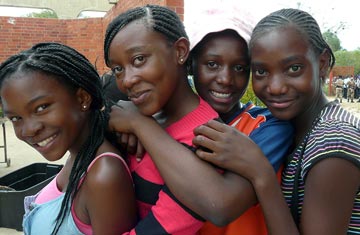
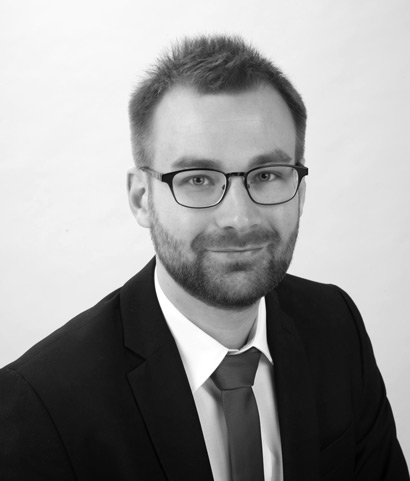

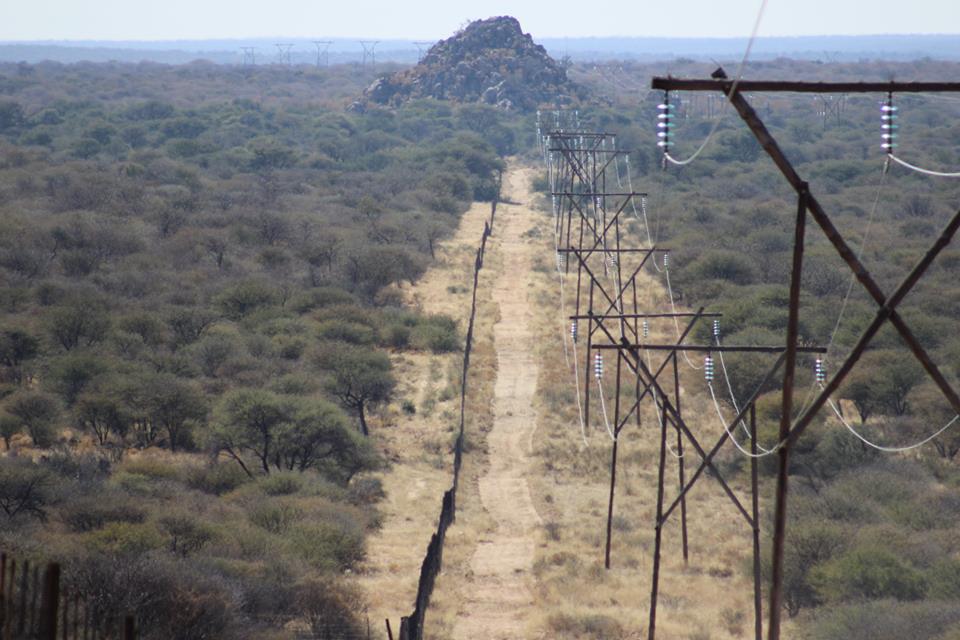
-page-1.jpg)
